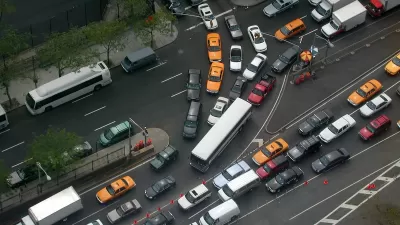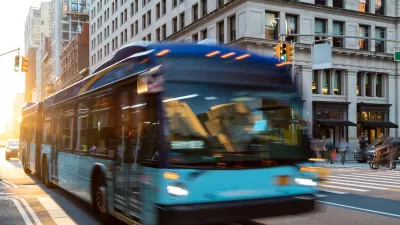Transportation costs are the second-highest household expenditure behind housing for all income levels.

The lowest-income U.S. households shoulder the biggest burden, proportionally, when it comes to transportation costs, according to a report from the U.S. Department of Transportation’s Bureau of Transportation Statistics.
Dan Zukowski outlines the findings in Smart Cities Dive, noting that “Although households with incomes of $28,261 or less spent the least on transportation overall, those expenses consumed nearly 32% of their pre-tax income.” Meanwhile, households at the higher end of the income scale (above $148,682) spent 9.6 percent of their income on transportation, though they spent more overall.
Transportation expenses were the second-largest average household cost for all income levels behind housing, and vehicle ownership and maintenance made up the largest purchases. “Average transportation costs for households in 10 U.S. cities jumped more than 41% over a 10-year period leading up to 2022-2023, according to a separate report from the New York State Comptroller in October.”
FULL STORY: Lowest-income households face highest transportation cost burden: federal report

Maui's Vacation Rental Debate Turns Ugly
Verbal attacks, misinformation campaigns and fistfights plague a high-stakes debate to convert thousands of vacation rentals into long-term housing.

Planetizen Federal Action Tracker
A weekly monitor of how Trump’s orders and actions are impacting planners and planning in America.

In Urban Planning, AI Prompting Could be the New Design Thinking
Creativity has long been key to great urban design. What if we see AI as our new creative partner?

Baker Creek Pavilion: Blending Nature and Architecture in Knoxville
Knoxville’s urban wilderness planning initiative unveils the "Baker Creek Pavilion" to increase the city's access to green spaces.

Pedestrian Deaths Drop, Remain Twice as High as in 2009
Fatalities declined by 4 percent in 2024, but the U.S. is still nowhere close to ‘Vision Zero.’

King County Supportive Housing Program Offers Hope for Unhoused Residents
The county is taking a ‘Housing First’ approach that prioritizes getting people into housing, then offering wraparound supportive services.
Urban Design for Planners 1: Software Tools
This six-course series explores essential urban design concepts using open source software and equips planners with the tools they need to participate fully in the urban design process.
Planning for Universal Design
Learn the tools for implementing Universal Design in planning regulations.
planning NEXT
Appalachian Highlands Housing Partners
Mpact (founded as Rail~Volution)
City of Camden Redevelopment Agency
City of Astoria
City of Portland
City of Laramie





























